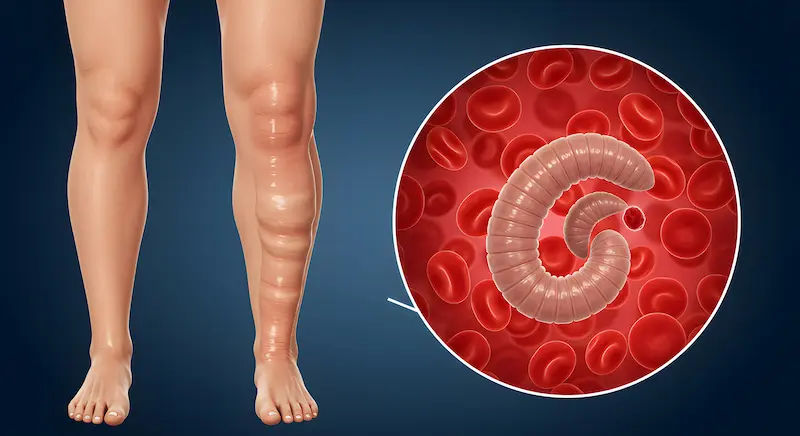Teratoma Overview: Symptoms, Causes, and Treatment
Know about the teratoma, what it is, causes, symptoms, diagnosis, management and treatment. Learn about the tips to prevent teratoma.

Written by
Last updated on 13th Jan, 2026

Introduction
If you or someone you know has been diagnosed with a teratoma, you might have questions about what it is, how it affects health, and what treatment options are available. This article will help you understand teratomas in simple terms, covering symptoms, causes, diagnosis, and treatment.
What Is a Teratoma?
A teratoma is a rare type of tumour that can contain various types of tissues, including hair, teeth, bone, or even organs. These tumours develop from germ cells (cells that form eggs or sperm) and can occur in various parts of the body, most commonly in the ovaries, testicles, or tailbone (coccyx).
Teratomas are usually benign (non-cancerous), but in some cases, they can become malignant (cancerous). They can occur in both children and adults, with some detected even before birth during pregnancy scans.
Types of Teratomas
1. Mature Teratoma (Benign) – The most common type, often containing fully developed tissues like skin, hair, or teeth.
2. Immature Teratoma (Potentially Cancerous) – Contains less developed tissues and may require more aggressive treatment.
3. Malignant Teratoma (Cancerous) – A rare form that can spread to other body parts.
Consult a General practitioner for Personalised Advice
Common Symptoms of a Teratoma
Symptoms depend on the location and size of the tumour. Some people may not experience any symptoms, while others may notice:
Ovarian Teratoma (in women)
- Pelvic pain or discomfort
- Swelling or a lump in the abdomen
- Irregular menstrual cycles
- Pain during intercourse
- Testicular Teratoma (in men)
- A painless lump in the testicle
- Swelling or heaviness in the scrotum
- Discomfort in the lower abdomen
- Sacrococcygeal Teratoma (near the tailbone, common in newborns)
- A visible lump at the base of the spine
- Difficulty with bowel movements or urination (if the tumour presses on nerves)
- Other Locations (rare)
- Brain or spinal cord – Headaches, seizures, or neurological symptoms
- Lungs or chest – Breathing difficulties, chest pain
- If you notice any unusual lumps, persistent pain, or other concerning symptoms, consult a doctor for further evaluation.
What Causes a Teratoma?
The exact cause is not fully understood, but teratomas develop from germ cells that grow abnormally. Possible factors include:
- Genetic mutations – Changes in cell development during fetal growth.
- Hormonal influences – Some teratomas may be linked to hormonal imbalances.
- Congenital (present at birth) – Sacrococcygeal teratomas often form before birth.
How Is a Teratoma Diagnosed?
If a teratoma is suspected, doctors may recommend:
1. Imaging Tests – Ultrasound, CT scan, or MRI to locate and examine the tumour.
2. Blood Tests – To check for tumour markers (like AFP or hCG) that may indicate malignancy.
3. Biopsy – Removing a small tissue sample for lab testing (if cancer is suspected).
Early diagnosis helps in planning the right treatment.
Get Your Health Assessed
Treatment Options for Teratoma
Treatment depends on the type, size, location, and whether it is cancerous.
1. Surgery (Most Common Treatment)
- Benign teratomas – Often removed surgically with minimal complications.
- Malignant teratomas – May require more extensive surgery to remove affected tissues.
2. Chemotherapy or Radiation (for Cancerous Teratomas)
Used if the tumour has spread or cannot be fully removed by surgery.
3. Monitoring (for Small, Non-Cancerous Tumours)
Some small teratomas may only need regular check-ups if they aren’t causing symptoms.
Living with a Teratoma: Tips for Management
If you’ve been diagnosed with a teratoma, here are some ways to stay healthy:
- Follow-up appointments – Regular scans ensure the tumour doesn’t grow back.
- Healthy lifestyle – A balanced diet and exercise support recovery.
- Emotional support – Talking to a counsellor or support group can help manage anxiety.
When to See a Doctor?
Seek medical advice if you experience:
- Unexplained lumps or swelling
- Persistent pain in the pelvis, testicles, or lower back
- Sudden changes in bowel or bladder function
- Early detection improves treatment success.
Final Thoughts
While a teratoma diagnosis can be concerning, most cases are treatable with surgery or other therapies. Staying informed and seeking timely medical help ensures the best outcome. If you have any concerns, don’t hesitate to reach out to a healthcare provider.
Consult a General practitioner for Personalised Advice
Consult a General practitioner for Personalised Advice

Dr D M Karthik
General Practitioner
4 Years • MBBS, Fellowship in Diabetes Mellitus, Advance certificate in Diabetes Mellitus, Derma Nutrition Certification
Visakhapatnam
Apollo 24|7 Clinic - Andhra Pradesh, Visakhapatnam

Dr. Siri Nallapu
General Practitioner
5 Years • MBBS
Hyderabad
Apollo 24|7 Clinic, Hyderabad

Dr. Rajib Ghose
General Physician/ Internal Medicine Specialist
25 Years • MBBS
East Midnapore
VIVEKANANDA SEBA SADAN, East Midnapore

Dr. Ajay K Sinha
General Physician/ Internal Medicine Specialist
30 Years • MD, Internal Medicine
Delhi
Apollo Hospitals Indraprastha, Delhi
(200+ Patients)

Dr. Ramya Hari
General Practitioner
18 Years • Medical Head & Family Physician, DG Shipping Approved Doctor, Panel Physician - UK Visa Medicals
Chennai
Apollo Medical Centre Kotturpuram, Chennai


